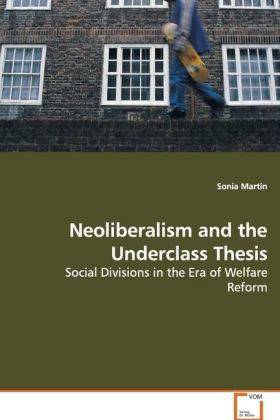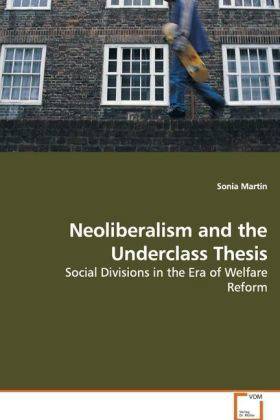
Bedankt voor het vertrouwen het afgelopen jaar! Om jou te bedanken bieden we GRATIS verzending (in België) aan op alles gedurende de hele maand januari.
- Afhalen na 1 uur in een winkel met voorraad
- In januari gratis thuislevering in België
- Ruim aanbod met 7 miljoen producten
Bedankt voor het vertrouwen het afgelopen jaar! Om jou te bedanken bieden we GRATIS verzending (in België) aan op alles gedurende de hele maand januari.
- Afhalen na 1 uur in een winkel met voorraad
- In januari gratis thuislevering in België
- Ruim aanbod met 7 miljoen producten
Zoeken
Neoliberalism and the Underclass Thesis
Social Divisions in the Era of Welfare Reform
Sonia Martin
Paperback | Engels
€ 77,95
+ 155 punten
Omschrijving
Adaptation of social policy to the ideas and
philosophies of a socially conservative
neoliberalism during the last quarter of the 20th
century has led to new and emerging social divisions
legitimised by contentious assumptions about human
behaviour. Some welfare recipients are considered
behaviourally and/or morally deficient, crystallised in conservative accounts of an 'underclass'.
This book is a critical analysis of social divisions
in the context of a neoliberal policy environment.
The period under study is 1980 to 2005, with
focussed attention on Australian social policies
under the Howard-led socially conservative liberal
government post-1996. Guided by critical social
theory, the analysis draws on data on social
divisions, policy records, and field interviews,
that shows contemporary social policy is informed by
contentious assumptions about human behaviour, and
subsequently converted into corresponding welfare
practice.
The findings are an important contribution to
theoretical debates about social policy and the
underclass phenomenon, and have strategic
implications for future policy directions.
philosophies of a socially conservative
neoliberalism during the last quarter of the 20th
century has led to new and emerging social divisions
legitimised by contentious assumptions about human
behaviour. Some welfare recipients are considered
behaviourally and/or morally deficient, crystallised in conservative accounts of an 'underclass'.
This book is a critical analysis of social divisions
in the context of a neoliberal policy environment.
The period under study is 1980 to 2005, with
focussed attention on Australian social policies
under the Howard-led socially conservative liberal
government post-1996. Guided by critical social
theory, the analysis draws on data on social
divisions, policy records, and field interviews,
that shows contemporary social policy is informed by
contentious assumptions about human behaviour, and
subsequently converted into corresponding welfare
practice.
The findings are an important contribution to
theoretical debates about social policy and the
underclass phenomenon, and have strategic
implications for future policy directions.
Specificaties
Betrokkenen
- Auteur(s):
- Uitgeverij:
Inhoud
- Aantal bladzijden:
- 264
- Taal:
- Engels
Eigenschappen
- Productcode (EAN):
- 9783639110692
- Uitvoering:
- Paperback

Alleen bij Standaard Boekhandel
+ 155 punten op je klantenkaart van Standaard Boekhandel
Beoordelingen
We publiceren alleen reviews die voldoen aan de voorwaarden voor reviews. Bekijk onze voorwaarden voor reviews.









